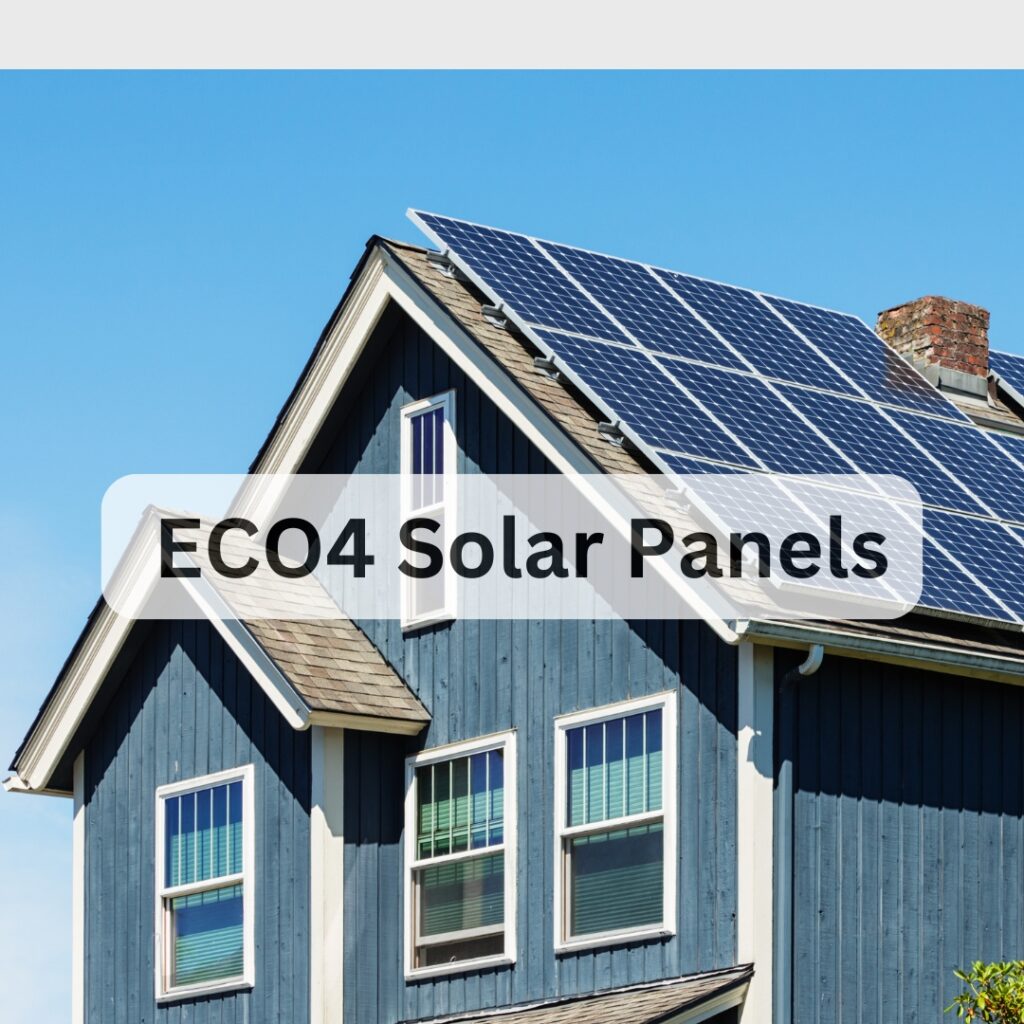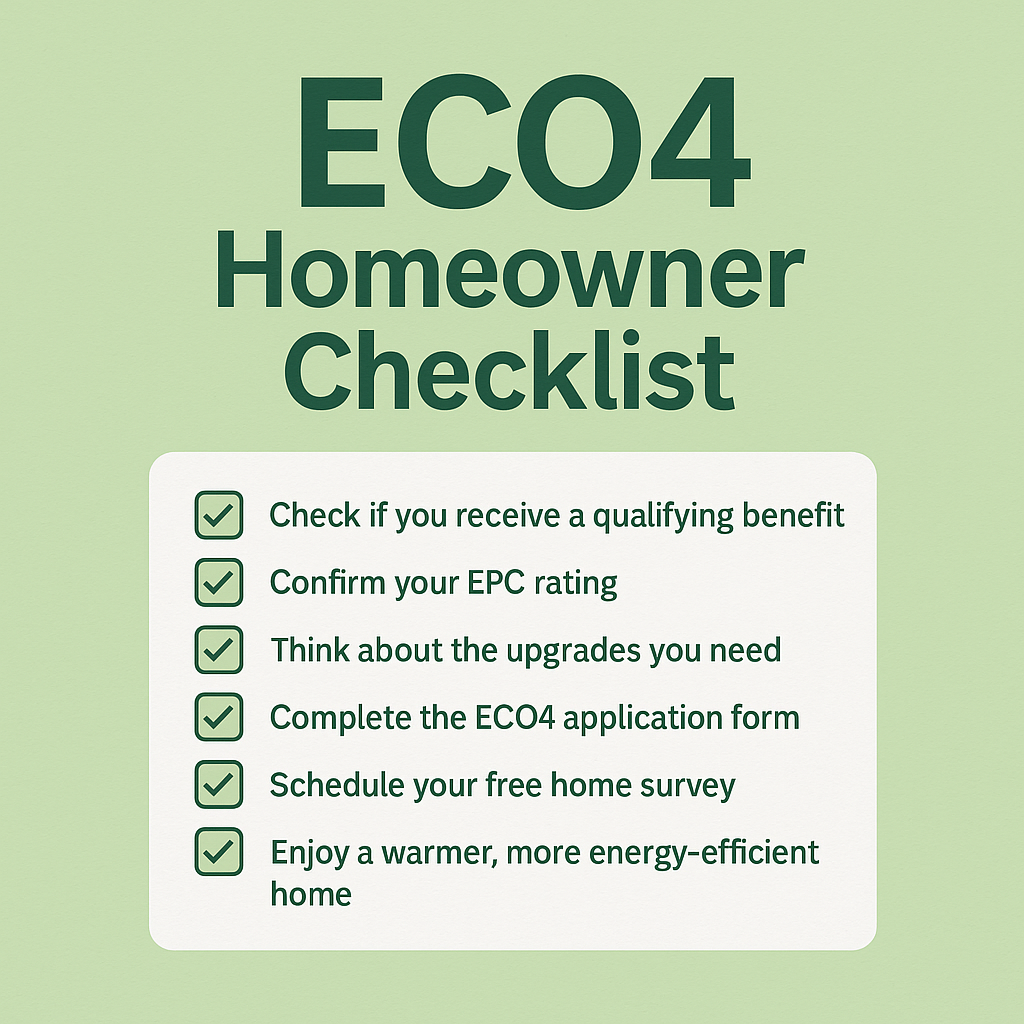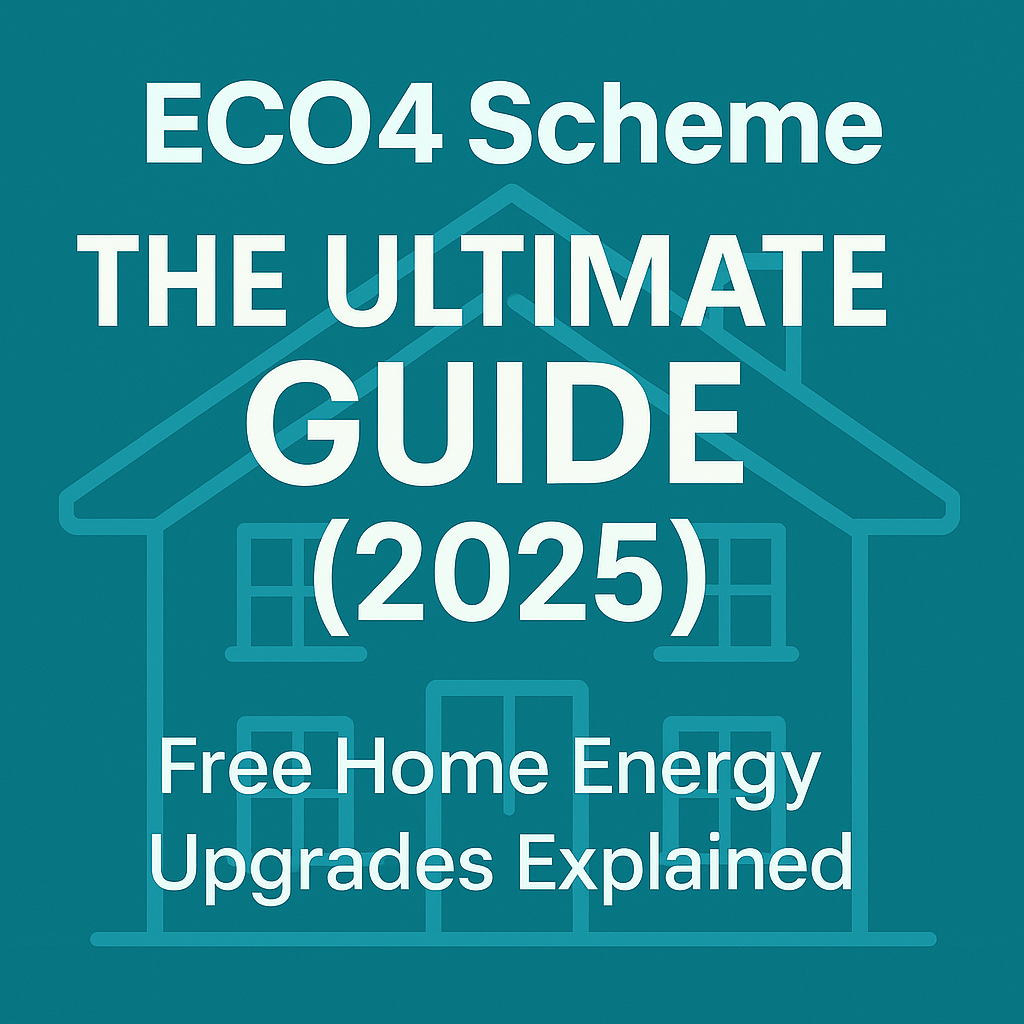The ECO4 scheme is a government-funded initiative designed to help low-income households transition to more energy-efficient solutions, including solar panels. With the ECO4 scheme, eligible homes can receive free solar panel installation, drastically cutting down on energy costs and promoting sustainability. This programme is part of a broader effort to combat fuel poverty and reduce carbon footprints.
We understand that navigating the application process can be daunting. That’s why we’ll break down how the ECO4 scheme works, who qualifies, and what the benefits are. From lessening your energy bills to enhancing your property’s value, the ECO4 scheme offers significant advantages that make it worth considering.

We’ll guide you through the eligibility criteria and demonstrate how to get started with your solar panel installation. Coupled with additional energy-efficient measures like insulation and boiler upgrades, the ECO4 scheme provides a comprehensive approach to making your home greener and more cost-effective.
Key Takeaways
- The ECO4 scheme offers free solar panel installation for eligible low-income households.
- We will explain how to qualify and navigate the application process.
- The scheme includes other energy-efficient upgrades to make homes more sustainable.
Understanding the ECO4 Scheme
The ECO4 Scheme is an important initiative aimed at improving energy efficiency and reducing fuel poverty in the UK. It builds upon previous phases of the Energy Company Obligation (ECO) programme with enhanced measures to support low-income and vulnerable households.
Origins and Evolution of the ECO Scheme
The ECO Scheme was introduced by the UK Government to tackle the twin challenges of carbon emissions and high energy bills. Launched in 2013, it aimed to reduce household energy consumption and support vulnerable communities. The scheme has gone through multiple phases, with each phase bringing new elements and improvements.
ECO4, the latest phase, began in 2022 and is set to run until 2026. This phase places a greater emphasis on renewable energy sources, such as solar panels, and energy-efficient upgrades like loft insulation and roof insulation. Through ECO4, we can provide grants for various energy-saving measures, making it accessible to more households in need.
Role in Combating Fuel Poverty
Fuel poverty is a significant issue affecting many households in the UK. The ECO4 Scheme directly addresses this concern by offering grants for energy-efficient home improvements, reducing energy bills, and alleviating financial strain.
By implementing upgrades like solar panels, more efficient heating systems, and insulation, the scheme aims to lower the overall energy consumption of homes. This not only helps in reducing fuel poverty but also contributes to the UK’s carbon reduction targets. Additionally, the ECO4 Scheme is designed to ensure that the most vulnerable households receive the necessary support to improve their living conditions.
Eligibility Criteria for the ECO4 Scheme
To be eligible for the ECO4 scheme, households must meet strict criteria related to home profiles, income, and benefits. The application process involves thorough assessments to ensure compliance with the scheme’s standards.
Qualifying Home Profiles
Homes must fall under specific categories to qualify for the ECO4 scheme. Primarily, these include low-income and vulnerable households. The scheme covers homes in various regions, notably Portsmouth, Southampton, West Sussex, Brighton, Peterborough, and Croydon. Both homeowners and tenants can apply, provided the home is energy inefficient and belongs to the designated local authority areas.
Eligible homes are those requiring improvements to energy efficiency. The scheme aims to reduce carbon footprints and enhance living conditions.
Income and Benefit Requirements
The ECO4 scheme sets income thresholds that applicants must not exceed. Households need a total income of under £30,000 to qualify. Additionally, those receiving specific benefits are also eligible. These benefits include:
- Child Tax Benefits
- Income-Based Jobseekers Allowance
- State Pension Support
Applicants must provide proof of income and benefits during the application process. This ensures that aid is directed towards those in genuine need.
Assessment and Application Process
The application process for the ECO4 scheme starts with an initial assessment of the household’s eligibility. This involves a review of income, benefits, and home energy efficiency.
Once eligibility is confirmed, a detailed energy audit of the property is conducted. This audit identifies the required improvements. Upon successful approval, the installation of energy-efficient upgrades, including solar panels, is arranged.
Applicants must engage with their local authority to initiate the application. This ensures a single point of contact throughout the process, simplifying communication and coordination.
Implementing Solar Panels with ECO4
Implementing solar panels through the ECO4 scheme offers a practical and financially beneficial way to improve energy efficiency in homes. We’ll explore the feasibility of installation, financial considerations, and the availability of grants to support this eco-friendly upgrade.
Feasibility and Assessment for Installation
To implement solar panels, the initial step involves assessing the property’s suitability. We should examine the roof’s size, orientation, and structural integrity. South-facing roofs without significant shading are ideal for maximising sunlight exposure.
Energy suppliers and certified installers can perform these assessments. They will check if the rooftops can support the panels and if the local climate is conducive to solar energy. This assessment ensures that the homeowners and tenants receive optimal energy efficiency benefits from their investment.
Financial Considerations and Funding
Understanding the financial aspects of solar panel installation is crucial. While the upfront costs can be significant, the long-term savings on energy bills are substantial. We need to consider potential installation costs, maintenance, and any additional equipment required for the system.
The ECO4 scheme provides funding options to reduce these costs. By leveraging government grants and support from energy suppliers, homeowners can mitigate initial expenses. This makes it more accessible for households with limited budgets, promoting broader adoption of eco-friendly technology.
Solar Panel Grant Availability
The ECO4 scheme offers solar panel grants to support the installation process. These grants aim to make solar energy accessible to a wider range of households, particularly those classified as low-income or receiving state benefits.
To qualify, properties often need to meet certain criteria, such as having an Energy Performance Certificate (EPC) rating that indicates room for improvement in energy efficiency. Areas such as Portsmouth, Southampton, and Peterborough are noteworthy for grant eligibility. By taking advantage of these grants, we can significantly reduce the financial burden of implementing solar panels.
Implementing solar panels through the ECO4 scheme is a practical, cost-effective approach to achieving greater energy efficiency and ecological sustainability in our homes. Proper assessment, financial planning, and grant opportunities play pivotal roles in this endeavour.
Benefits of Solar Energy in Homes
Solar energy provides a multitude of advantages for homeowners, ranging from financial savings to environmental benefits. Let’s explore the key benefits of installing solar panels in our homes.
Reduced Energy Costs and Carbon Footprint
By harnessing solar energy, we can significantly reduce our energy bills. Solar panels convert sunlight into electricity, allowing us to generate our own power. This reduces reliance on the grid, resulting in lower utility expenses. Additionally, solar energy is a clean power source, helping us reduce our carbon emissions. Using solar panels diminishes our carbon footprint and contributes to a more sustainable lifestyle.
Increased Property Value
Homes equipped with solar panels often see an increase in property value. Potential buyers are increasingly looking for energy-efficient homes, making properties with solar installations more attractive. The ability to generate renewable energy and lower energy costs can be a selling point. As a result, investing in solar energy can provide benefits not only through savings on bills but also through enhanced property resale value.
Supporting Studies:
1. Swansea University & Zoopla Data (UK Research)
A meta‑study using extensive Zoopla housing data across nearly 1.5 million UK listings found that homes with solar panels sell for 6.1 % to 7.1 % more than comparable properties without them—equating to a potential uplift of £14,000–£16,000 for an average‑priced home ubdc.ac.uk.
2. Rightmove’s Green Homes Reports (UK Data)
- Rightmove’s Green Homes Report (2022) shows that homes upgrading from an E to D EPC rating see an average 4 % increase in value, while moving from D to C brings an additional 4 % boost leoht.co.uk.
- Bloomnight analysis suggests that one‑grade improvements to EPC can translate into £5,000–£10,000 added value, while two‑grade jumps could add up to £17,500 insights.bloomnights.com.
- Moreover, solar panels—by improving energy efficiency—play a key role in helping homes achieve these higher EPC ratings The Eco Expertsinsights.bloomnights.com.
3. KAMMA Climate (Mortgage Industry Perspective)
Analysis based on mortgage‑valuations indicates that improving a home’s EPC rating—especially raising it to C or above—can yield an average 12.5 % increase in property valuation. Mortgage lenders indeed regard energy‑efficient homes as lower risk, which supports this uplift Kamma Climate
Promoting Renewable Energy Sources
Adopting solar energy helps us promote the use of renewable power sources. By installing solar panels, we support the transition to a greener future. Solar energy reduces our dependence on fossil fuels and minimises environmental pollution. Our use of solar power sets an example for the community, encouraging others to adopt sustainable practices and contribute to the global effort against climate change.
Complementary Measures for Enhanced Efficiency
Enhancing the efficiency of solar panel installations involves integrating various complementary measures. These include robust insulation practices, advanced heating system upgrades, and smart energy management solutions.
Insulation Integration with Solar Installations
Combining solar panel installations with effective insulation methods can significantly boost energy efficiency. Proper loft insulation and cavity wall insulation prevent heat loss, ensuring that the energy generated by solar panels is optimally utilised.
- Loft Insulation: By adding or upgrading loft insulation, we can drastically reduce the amount of heat escaping through the roof.
- Cavity Wall Insulation: Filling the gaps between walls with insulating material helps maintain indoor temperatures, reducing the need for additional heating or cooling.
Incorporating these insulation practices can lead to better energy performance certificates and lower energy bills.
Heating System Innovations and Upgrades
Upgrading heating systems alongside solar panel installations can further enhance home energy efficiency. Modern solutions like heat pumps and efficient boilers transform how homes use energy.
- Heat Pumps: These systems transfer heat from external sources to interior spaces, reducing the reliance on conventional heating methods. They are particularly effective when powered by solar energy.
- Boilers: Replacing older boilers with energy-efficient models ensures that less energy is wasted in the heating process.
Heating system upgrades not only improve energy efficiency but also contribute to meeting carbon reduction targets by lowering fossil fuel dependence.
Smart Energy Management Solutions
Smart energy management solutions can optimise the benefits of solar panels and complementary measures like insulation and heating system upgrades. Employing advanced technologies ensures that energy usage is monitored and controlled more effectively.
- Smart Meters: These devices provide real-time data on energy consumption, helping us identify areas where energy use can be reduced.
- Automated Systems: Integration with home automation systems allows for the automatic adjustment of heating and cooling settings based on real-time needs, maximising energy efficiency.
By combining solar panels with smart energy management, we can ensure that our homes use energy in the most efficient manner possible, leading to further cost savings and environmental benefits.
Navigating the Application Process
To successfully apply for solar panels under the ECO4 scheme, there are several important steps you need to take. Key tasks include consulting with energy suppliers and local authorities, accessing the right information and resources, and ensuring proper maintenance after installation.
Consultation with Energy Suppliers and Local Authorities
First, you need to consult with your energy supplier and local authorities to check your eligibility for the ECO4 scheme. Energy companies like British Gas, E.ON, EDF, Octopus Energy, and Scottish Power are key participants in the scheme. They can provide you with the necessary information and guide you through the process.
Contact your local authority as well, as they might offer additional support or complementary schemes. This dual approach ensures you get comprehensive guidance on both the technical and administrative aspects.
Accessing Information and Resources
Accessing accurate and detailed information is crucial. The Ofgem website is a valuable resource for understanding the specifics of the ECO4 scheme. It offers guidelines on eligibility, application forms, and details about available grants. Your energy supplier’s website is another important source of up-to-date information.
It might be useful to participate in informational webinars or workshops offered by local authorities or energy suppliers. These sessions can provide deeper insights and practical advice on navigating the application process.
Maintenance and Aftercare Post-Installation
Once the solar panels are installed, ensuring proper maintenance is essential. Solar panels require minimal maintenance, but regular inspections can help prevent potential issues. It’s important to establish a maintenance schedule with your energy supplier or installation provider.
Consider securing a warranty to cover repairs and any necessary replacements. Many providers also offer packages that include solar batteries, which can enhance your system’s efficiency and reliability. Proper aftercare ensures the longevity and optimal performance of your solar panels, contributing to sustained energy savings.
Outlook for the Future of the ECO4 Scheme
The ECO4 scheme is set to continue driving energy efficiency improvements in the UK, addressing government targets, advancements in renewable technology, and steps towards enhanced energy security.
Governmental Targets and Policy Updates
The UK government has set ambitious targets to reduce carbon emissions and improve home energy efficiency. The ECO4 scheme contributes significantly towards these goals, building on the success of ECO3. Our focus remains on improving Energy Performance Certificate (EPC) ratings, reducing fuel poverty, and increasing the sustainability of residences across the country.
Key updates in governmental policy include ensuring that households with incomes less than £31,000 or those on qualifying benefits receive primary assistance, as outlined in the government’s ECO4 policy. Monitoring and updating the policy to meet evolving sustainability targets will be ongoing.
Advancements in Renewable Technology
Technological advancements are pivotal in enhancing the reach and effectiveness of the ECO4 scheme. Innovations in solar panel technology, battery storage solutions, and home energy management systems are enabling more efficient use of renewable energy sources. These advancements not only improve energy efficiency but also make renewable energy more accessible and affordable for low-income households.
Our scheme prioritises integrating the latest in green technology. For instance, the process of acquiring solar panels through ECO4 has been streamlined to ensure that households can easily access and benefit from these advancements, further supporting environmental sustainability.
Steps towards Enhanced Energy Security
Enhancing energy security is a significant aspect of the ECO4 scheme. By reducing dependency on fossil fuels and increasing the use of renewable energy sources, we contribute to a more stable and secure energy future. The ongoing efforts to tackle fuel poverty through energy-efficient improvements significantly impact our energy security strategy.
Measures under the ECO4 scheme are designed to make homes more resilient to energy price fluctuations and supply disruptions. Our commitment is reflected in the broader aim to secure a sustainable energy future for vulnerable households, aligning with national energy security policies. This approach ensures a reliable supply of green energy while supporting overall sustainable development goals.
Frequently Asked Questions
We provide answers to some of the most common questions regarding the ECO4 scheme’s solar panels, covering costs, eligibility, government support, and availability in the UK.
How much do solar panels cost under the ECO4 scheme?
The ECO4 scheme aims to offer free solar panels to eligible households. This provision significantly reduces the financial burden of switching to renewable energy. The criteria for accessing these funds will be discussed next.
Who is eligible for solar panel funding through the ECO4 scheme?
Eligibility for the ECO4 scheme requires a household income of less than £30,000 or receiving a state benefit or pension. The property’s Energy Performance Certificate (EPC) rating also affects eligibility. Specific areas such as Portsmouth, Southampton, and Croydon may have local grants available.
What are the reviews for solar panels installed through the ECO4 scheme?
Reviews indicate that solar panels provided through the ECO4 scheme have successfully reduced annual bills by a substantial amount. Participants report improved energy efficiency and reduced carbon footprints, highlighting the scheme’s benefits and effectiveness.
How does the government support solar panel installation in the current ECO4 scheme?
The government supports solar panel installation via the ECO4 scheme by providing grants and subsidies. The scheme started in August 2022 and aims to run until March 2026. It helps vulnerable households improve their energy efficiency, thereby reducing carbon emissions and reliance on fossil fuels.
Are there ECO4 solar panel installation services available in Scotland?
For residents in Scotland, energy efficiency advice and support are accessible through the Home Energy Scotland (HES) helpline. While the ECO4 scheme primarily benefits England and Wales, Scottish residents can receive similar benefits by contacting HES at 0808 808 2282.
What are the latest updates on the availability of the ECO4 scheme for solar panels in the UK?
As of the latest updates in 2024, the ECO4 scheme continues to provide significant benefits to qualifying households. Ongoing governmental support ensures that the scheme remains a viable means for many to adopt solar energy and reduce energy bills efficiently.



